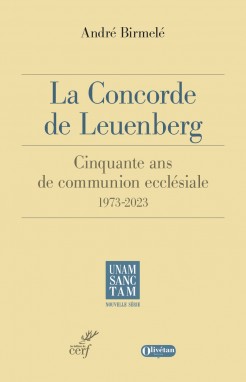
This book was published on the occasion of the 50th anniversary of the Leuenberg Agreement, which declares the communion between the European churches of the Lutheran and Reformed traditions. This concord came into force in 1974 after it had been approved by the synods of these churches. Following ratification by the Methodist family in 2002, it gave rise to the Community of Protestant Churches in Europe (CPCE).
Church fellowship means unity of the church. The participating churches recognize each other as authentic expressions of the one Church of Jesus Christ, respecting their particular history, spirituality, piety and theological emphases. They declare church communion and their willingness to realize and implement this in the future in the life of each individual signatory church. This decision includes the possibility of transition from one family to another for each believer and also for the ministers.
After an outline of the history that overcame the contradictions of the 16th century, the text of the Agreement is presented together with a theological commentary. The development of the CPCE is then described on the basis of the plenary assemblies of the participating churches, which take place every six years. An important chapter, which contains an analysis of the Church of Jesus Christ (an important document from 1994), is devoted to ecclesiology (the understanding of the church, its characteristics, its ministries and its unity
This model of living unity went beyond the borders of Europe and led to similar agreements in North America and the Middle East. The Methodist churches joined this fellowship in 1998. Other denominational boundaries were also crossed. The approach served as a model for agreements with the Anglican Communion. The option of a differentiating consensus has also opened up new paths in the dialog with Rome.
The final chapter of this book addresses the progress made and also the challenges. The history of the Leuenberg Agreement and the CPCE is both a conclusion and a starting point. It would be fatal to be satisfied with what has been achieved. The process always requires consideration of new challenges and even reorientation. The concern for a truly lived catholicity and in particular the need for a common synod are the greatest challenges to be overcome.
